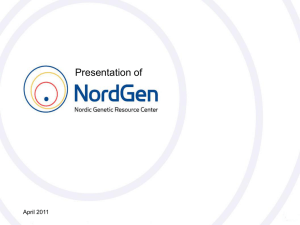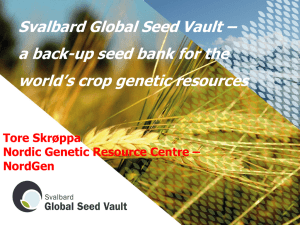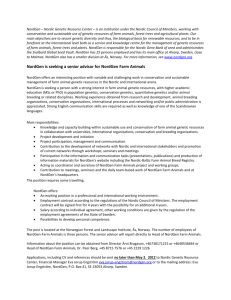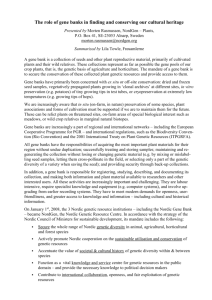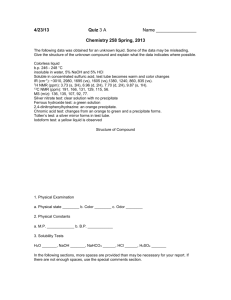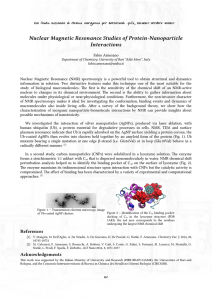Meeting 2
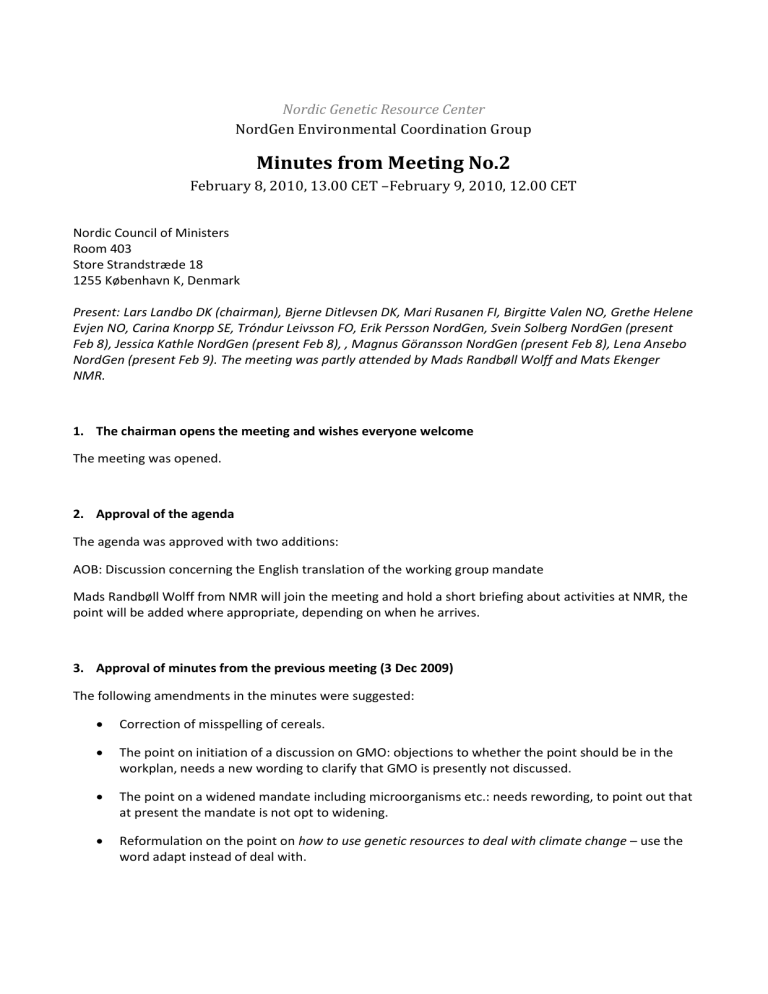
Nordic Genetic Resource Center
NordGen Environmental Coordination Group
Minutes from Meeting No.2
February 8, 2010, 13.00 CET –February 9, 2010, 12.00 CET
Nordic Council of Ministers
Room 403
Store Strandstræde 18
1255 København K, Denmark
Present: Lars Landbo DK (chairman), Bjerne Ditlevsen DK, Mari Rusanen FI, Birgitte Valen NO, Grethe Helene
Evjen NO, Carina Knorpp SE, Tróndur Leivsson FO, Erik Persson NordGen, Svein Solberg NordGen (present
Feb 8), Jessica Kathle NordGen (present Feb 8), , Magnus Göransson NordGen (present Feb 8), Lena Ansebo
NordGen (present Feb 9). The meeting was partly attended by Mads Randbøll Wolff and Mats Ekenger
NMR.
1.
The chairman opens the meeting and wishes everyone welcome
The meeting was opened.
2.
Approval of the agenda
The agenda was approved with two additions:
AOB: Discussion concerning the English translation of the working group mandate
Mads Randbøll Wolff from NMR will join the meeting and hold a short briefing about activities at NMR, the point will be added where appropriate, depending on when he arrives.
3.
Approval of minutes from the previous meeting (3 Dec 2009)
The following amendments in the minutes were suggested:
Correction of misspelling of cereals.
The point on initiation of a discussion on GMO: objections to whether the point should be in the workplan, needs a new wording to clarify that GMO is presently not discussed.
The point on a widened mandate including microorganisms etc.: needs rewording, to point out that at present the mandate is not opt to widening.
Reformulation on the point on how to use genetic resources to deal with climate change – use the word adapt instead of deal with.
In point 6; a sentence starting with “In relation to the mandate regarding…” is currently unclear and needs reformulation.
Decision: New version of the minutes will be ready by tomorrow by Erik.
4.
Presentation
A round-the-table presentation of the participants.
5.
News from the members
A brief round-the-table presentation of news from the group members :
Finland is working on gene conservation on a long term basis. The Finnish council of genetic resources has established a working group on how to ensure long term conservation of genetic resources, to identify weak points and concerns for future – including legal aspects, and types of contracts.
Norway is preparing for next meeting on Access and Benefit Sharing in Cali, Columbia in March 2010. They are working on a paper for the parliament on agriculture and food. Norway and Indonesia prepare a collaborative project on genetic resources.
Sweden is back from Swedish EU presidency, not much news.
Faroe Islands: work on a new law on Nature Conservation has been announced, where one can hope for a more modern view on the needs for e.g. species and gene conservation. The agricultural sector is undergoing a structural change (i.e. the professional part of the sector -fewer and larger dairy farm units).
The Agric. Agency has announced an increased attention into the old sheep breed as well as into sparing the old farming landscape(hayfield meadows) from development plans.
Denmark has a 3-year plan of action on plant genetic resources that ends in 2010. A new three year plan is proposed, but not yet approved, for 2011 - 2013. Denmark holds presidency of NMR in 2010. The most important topic on the agenda in the area of genetic resources concerns the organization of NordGen and obtaining financial security of NordGen.
6.
News from NordGen
News from NordGens Environmental coordinator:
Environment web page online at nordgen.org, click on environment.
The presentations from the conference on genetic resources in protected areas (GRIPA), are available at nordgen.org/gripa.
NordGen took part in Coop 15 in Copenhagen in December, and produced a brochure for the occasion (being distributed in the meeting). Two days were assigned for information about climate change, biodiversity and food security, and two days were assigned for informing about the
Svalbard Global Seed Vault (SGSV).
There is presently a Red Cross exhibition in “Humanitetens hus” in Malmö, where NordGen has contributed the information on food security, and SGSV.
NordGen has started recycling.
News from NordGens working groups:
Forages working group: Project on phenotypic characterization of red clover in Norway, invention of old meadows in Iceland, collection of Beta maritima.
Fruit, Berries and Ornamentals working group: The Bilberry project was completed. Finnish project investigating phenolic compounds in Ribes, and Vitamin C in Fragaria.
Vegetable and Medicinal and aromatic plants working group: A lot of incoming seeds from companies that are shutting down. New material has also been collected in the Nordic countries.
In 2009 a collection of relict plants in Denmark, an article on relict species by Bernt Løytnant was distributed to the meeting participants. A need to work more on this issue on a Nordic level – goes into in situ conservation. No clear border between relict species and wild crop relatives – need to clarify responsibilities.
News from NordGens director:
During the last steering group meeting for the NMR climate change program, three applications were approved: one about genetic resources and pre-breeding, one concerning fish, and one concerning emissions of greenhouse gases from farming. Two or three new calls to cover diseases related to climate change in Plants, animals and trees will be announced before Eastern with deadlines in June.
Background of the NMR Climate change programme: Budget is 40 million during 4 years, any new calls will be for three years. Supports network groups, consisting of a minimum of three countries from Nordic region (including the self governing areas) or the Baltic States. There is a demand for 50% self-finance in the applications.
The working group on financial and organizational future for NordGen discussed three possible future arrangements for NordGen:
Like now, but with each Nordic country inputting equal amount as their share of NMR.
To take NordGen out of NMR and make it an independent international organization outside.
Attach NordGen to an already existing institution outside of NMR, this is a solution to overcome the
8-year rule.
Pre Breeding activities: a Norwegian proposal of a 10 million project on pre breeding – will be further discussed in March.
A discussion pointed to the unclear relation between the NMR terrestrial ecosystem working group and
NordGen.
A clarification of the working groups within NMR and their respective mandates is requested. Ask Mads
Randbøll Wolff to give an overview.
7.
Work plan for 2010
There was a last minute email response from the farm animal sector regarding the work plan.
Erik, Bjerne and Lars have written a draft work plan. Lars requests a prioritization among activity proposals in the work plan.
The activities of the work plan will be ordered according to a system with four categories:
1.
A limited number of high priority activities that we believe can be completed this year.
2.
Activities that can be started but not completed in 2010.
3.
Issues that will not be started 2010, but kept in the back of our minds for later discussions.
4.
4. Proposals that the group decide not to engage in.
General comments
The group suggests including lighter activities into the work plan, where the group can discuss and report directly to NordGen.
The work plan is at an annual basis but many activities have a longer time span. The reason for an annual work plan is that the budget is provided on an annual basis. There was a suggestion to include a time scheme over activities for the period of the current mandate (2009 – 2011).
Decision: Erik will provide a time scheme in the end of the work plan (until 2011).
Mandate
Decision: to use the English translation of the mandate in the work plan. If any questions arise regarding the mandate, the Swedish text is the official version, approved by the NordGen board.
At this point of the meeting, Mads Randbøll Wolff from NMR joined the meeting. The minutes from this event are found under point 8. Any Other Business/Next meeting.
The meeting returns to point 7 in the agenda: Work Plan for 2010
Mandate , Members and Modus Operandi sections are approved.
Meetings
Next meeting date will be discussed under point 8 Any Other Business/Next meeting.
Newsletter and reporting
Decision: The meeting minutes will be circulated by email among all group members before they are approved. After approval they will be made publicly available on the NordGen home page. In addition, the meeting minutes will be distributed to NordGen board members.
Tasks for 2010
1. Conference on in situ conservation of Nordic plant genetic resources
Merete Åsmo Finne has published a report on crop wild relatives in the Nordic region. Guðmundur
Halldorsson has made the RENO project; a compilation of a recepy book of cases from the whole Nordic region. Gives examples of success stories and failures. Available online.
Erik will contact Johan Bodegård at the Swedish Species Information Centre (Artdatabanken) regarding the conference.
Decision: Consensus to arrange conference. Erik will make a first program draft and circulate within the group before Easter to allow time for discussions.
Category 1. Prioritized during 2010.
Proposition to hold the conference during week 46 or 47.
2. Genetic resources and climate change
Discussion: The previous Svalbard seminar on climate change and genetic resources led to a statement from the five Nordic agricultural ministers. Planning a new seminar in Svalbard 2011 – climate change related objectives. Possibility to prepare a report to give input to the Svalbard meeting and the
Commission meeting in 2011.
NMR published two articles on genetic resources and climate change 2009.
Need for a strategy paper on crop/animal/forestry in light of climate change. Identifying strategies related to genetic resources, e.g. day length requirements are essential in plant breeding for our region.
New pathogens are expected. Aspects of adaptation and mitigation should be covered. Include ecosystem perspective in climate change effects.
Two different publications: 2 pages paper for NMR/Politicians, addressing importance of genetic resources related to climate changes – NordGen could provide it. One longer, more elaborated report with scientific arguments behind it – expert report.
Need to have economic numbers related to GR and climate change.
Decision: NordGen produces a short paper – aimed at politicians. Include examples from plant genetic resources for food and agriculture, forest genetic resources and farm animals. Draft circulated in the group for inputs. The group will decide at its next meeting whether to take the next step and appoint an expert group to produce a more extensive paper.
Present the paper at the summer meeting of Nordic Council of Ministers.
3. Year of Biodiversity 2010
The discussion concerned an exhibition as an opportunity to link biodiversity with genetic resources.
An electronic journal “Luonnon kirjo” by several ministries is coming out during this year as part of Year of Biodiversity, the possibility to include material on NordGen could be searched.
Decision: Not include Biofuels, The value of Ecosystem services, Climate Change. We will turn the
“Nordic Approach to Biodiversity” exhibition around – by contacting National countries and Genetic resource programs to compile and make their activities visible on NordGen home page.
Regarding the discussion of value of ecosystem services, the point should be kept in the work plan, however not as part of the year of biodiversity 2010. For sources of economic impact of ecosystems, the
Sukhdev report is a source of information. Erik will look into the Sukhdev-report and “Payment of ecosystem services” – a report on value of ecosystems; and he will also investigate possible collaboration with the Environment and Finance Group and the Terrestrial Ecosystems Group.
The meeting was adjourned at 17.20.
The meeting was continued the second day at 09.00.
The chairman re-opened the meeting.
Erik presented a revised version of the minutes from Meeting 1, according to comments from the members the day before. This version will be sent out by e-mail to all members to comment on, before approval by the chairman.
Erik continued to recapitulate yesterday’s decisions about the work plan draft.
The meeting continued with the rest of the agenda, starting at number 4 of the proposed tasks in the work plan.
4. Access to and Benefit Sharing of genetic resources in in situ conditions
The members discussed the need of sharing information and experiences between countries about
Access to and Benefit Sharing of genetic resources (ABS) in in situ conditions. Some countries have worked more than others with the implementation. International legislation has to be followed by all, but there is flexibility in the implementation in each country.
Decision: This project has a high priority, category 2 (see also paragraph 9).
Decision: As a first step, the ABS in in situ conditions will be put on the agenda of the in situ conference decided on earlier. It is important to high-light the need for collaboration on the implementation, when the legislations are ready.
Decision: A short report on the outcome of the Conference of the Parties (COP10) of the Convention of
Biodiversity (CBD), at which it is planned to come to an agreement regarding ABS, will be presented at the next group meeting. For the record: Mari Rusanen informed about a two-year project funded by
NMR – Searching for appropriate legislation, regulation, access, and exclusive rights to forest genetic
resources in the Nordic region. Results will be presented in Vienna Sep 13, 2010,.
5. Conservation of species or populations?
The environment sector and the genetic resource sector use different approaches in their conservation efforts: conservation of species or landscapes, and of genotypes or populations. The meeting discussed how NordGen can build bridges between these approaches.
Decision: this project is given high priority, category 2. The topic will be dealt with during 2010 by putting it on the in situ conference agenda, giving examples from the forestry sector.
Suggestion: A new title of the project was suggested to be “Nature conservation and genetic resource conservation”.
6. Conservation of genes or conservation of varieties and races?
There is a question if gene banks should conserve varieties and races, or genes and alleles. It was agreed upon that in general is this topic outside the mandate of this group. However, the group
recommends NordGen to address this important question.
An element of this topic is the relative benefits of in situ and ex situ conservation.
Decision: The question of the relative benefits of in situ and ex situ conservation will be placed on the work plan for forth-coming years, i.e. placed in category 3.
7. Meadows
Erik informed the group about the meadow and pasture ecosystems that are of great importance for both nature conservation and genetic resource conservation. Some countries have done good work and others can learn from them. There is also the possibility to create a Nordic database regarding conservation of meadows and pastures.
The group agreed on that conservation of meadow and pasture ecosystems involves many actors e.g. within the environmental sector, the genetic resources sector regarding plants and animals, and the landscape sector. The group also agreed upon that the planned in situ conference does not have room for this topic.
Decision: this topic is placed in category 3, to be put on the agenda for 2011 for discussion and possibly a seminar on the topic.
8. Relict Plants
The group was introduced to the term relict plants by Svein Solberg during the first day of the meeting.
Erik informed that seeds of relict plants have been collected by NordGen together with the Danish botanist Bernt Løytnant close to monasteries, churches etc. Similar activities have been done in e.g.
Norway. This kind of genetic resources are clearly within the NG mandate, but the conservation responsibilities has fallen between chairs.
Decision: this topic is placed in category 4.
This group recommends that NordGen establishes an ad hoc working group for relict plants.
9. Should NordGen’s mandate be expanded to include other types of genetic resources than those of
crops, farm animals and forest trees?
The increased interest for new organism groups such as algae raises the question whether NordGen should include other types of genetic resources than those of crops, farm animals and forest trees. Erik clearly stated that NordGen has no possibility as it stands today to expand its mandate.
However, this topic generated a discussion and an agreement about that one important task of this working group is to keep track of and inform the board of NordGen about international developments that may be relevant for NordGen now or in the future.
Decision: It is not within the mandate of this working group to discuss whether NordGen should include new groups of organisms within its mandate, i.e. the project was placed in category 4.
Decision: ‘International developments’ will be a permanent point on the meeting agendas of this group.
Decision: The international development within the area of ABS will be a part of the new permanent information point on the agenda called: “International Development”
10. Forest genetic resources
The NordGen sector of Forestry would like an overview of how Nordic countries use existing protected areas as reserves for forest genetic resources, or if there are any plans to establish such areas. They are also interested in an overview of to what extent the regulation of protected areas in the Nordic countries allow for management in a way that is compatible with using the areas for conservation of forest genetic resources.
The group states that it is important that the right questions are asked, and that the answers are given by specialists.
Decision: The question of existing and planned use of protected areas for conservation of forest genetic resources will be included in the planned conference on in situ conservation.
The group suggests that the Working Group for Genetic Resources under NordGen Forest formulate questions, possibly in the form of a questionnaire. The group is willing to help the forest working group find the proper contacts for such a project.
11. The UN Convention on Biodiversity (CBD)
There is a need to discuss the implementations of the CBD on the Nordic level, to help identifying common Nordic problems, where Nordic cooperation would be beneficial, and possibilities and methods for cooperation between environmental, agricultural and forestry sectors. There is also a need to discuss common Nordic approaches to biodiversity issues that are within NordGen mandate but are not covered by CBD.
Decision: The group agreed upon that this topic will be discussed under the new permanent point
‘International developments’ of the meeting agendas.
At this point of the meeting Mads Randbøll Wolff and the environmental advisor Mats Ekenger of NMR joined the meeting. They informed that NMR would like that the emphasis of this working group is policy discussions.
Further procedures with the draft work plan
Erik will send out the revised draft work plan by e-mail and the group can comment on it, with copies to everyone, before approval. The work plan will then be sent to the NordGen board meeting in March
2010 for final approval.
8.
Any Other Business/Next meeting
A. Information from Mads Randbøll Wolff from NMR given to the members the day before. Mads welcomes the group to NMR.
NMR’s primary purpose for the group is to build bridges between the environmental and agricultural sectors, and to form a solid discussion forum. It is important for group members to bring back the discussions of the group to the ministries in their respective countries. The group works under NordGen, it is important to build confidence, especially with NMR committee of environment.
Brief information on NMR working groups: Under the environmental committee are presently seven or eight working groups, including the terrestrial ecosystem group. The NMR working groups are not presented on their webpage. There is an annual meeting of working group coordinators under the environmental committee, where Erik could be invited to participate.
Mia Rahunen at NMR is the group’s contact in the NMR Environmental committee.
The group requests information on other group members, as this would facilitate communication in the respective ministries and countries.
Decision: Mads can provide a list of permanent groups, mandates and group members.
Mads and Mia will on a daily basis assure that the group is well informed on NMR activities.
Terrestrial Ecosystem group is the group closest at hand.
Erik will be invited to the annual meeting with the NMR working group coordinators by Mads.
B. The revised English version of the mandate description of the Environmental coordination group made by Erik was adopted after a few comments. Erik reminded that more comments and reflections on the translation are welcome, whereas the Swedish version is the legal version.
It was pointed out that SamNordisk Skogsforskning (SNS) has for a long time used the English translation:
“The Nordic Forest Research Co-operation Committee” and thus used “cooperation” instead of
“coordination”. No decition was made on whther to substitute ‘coordination’ for ‘cooperation’ in the translation.
C. It was remarked that all members of the group are not yet nominated by all countries, and that there is a lack of experts in Farm animals in the group. It was suggested to remind the respective countries to nominate. It was also urged that the NordGen sector for Farm animals sends an observer to attend the group meetings.
D. The group raised the question whether a substitute for the appointed members can be sent to the group meetings.
To the protocol: it is the understanding of this group that the members of this group are nominated on personal basis but that it is possible to send a substitute to the meetings if needed.
E. The next meeting is aimed to be held in connection to the in situ conference in week 46 or 47 of 2010.
A question was raised whether another meeting is needed before the summer. The group agreed on that the chairman can take this decision if he finds that a meeting will be required for the planning of the in
situ conference.
F. The follow-up in situ conference is under planning.
Decision: a rough draft of the conference program, including suggestion of dates, shall be produced and circulated to the group before Easter.
9.
Conclusion of the meeting
The chairman thanked the members for a productive meeting and wished all a safe journey home.
Secretary §1-§7.3 Secretary §7.4-§9
__________________________________
Magnus Göransson
__________________________________
Lena Ansebo
Coordinator
__________________________________
Erik Persson
Chairman
__________________________________
Lars Landbo
Addition to point 3
The final version of the minutes from meeting No. 1 was decided on 2010-03-05 via e-mail and telephone
Addition to point 7
The final version of the work plan was decided on 2010-03-05 via e-mail and telephone
Coordinator Chairman
__________________________________
Erik Persson
__________________________________
Lars Landbo
